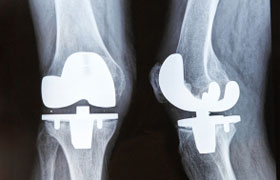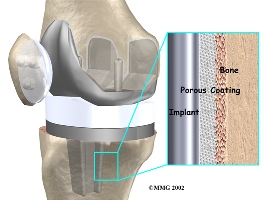
Introduction to Knee Replacements

Did you know that knee replacement is more common than any other type of joint replacement? Usually, they re a result of a painful condition affecting millions of Americans “ arthritis of the knee. Your knee joint consists of three bones that are covered with cartilage and slide over one another: the end of the femur, the top of the tibia, and the underside of the patella. Normally the cartilage is a smooth, glistening, white surface, which allows bones to move in an almost frictionless fashion. When you re suffering from arthritis of the knee, your cartilage becomes worn and degenerates. It attains a roughened, uneven appearance, and patches of cartilage flake off revealing the bony surface underneath.
Often, the pain and lack of function require serious treatment such as minimally invasive knee replacement surgery; including, partial knee replacement surgery or total knee replacement surgery. The knee replacement surgeons at AOSMI have decades of experience diagnosing and treating arthritis of the knee in the most effective and painless way possible.
Common Symptoms of Knee Arthritis

Early symptoms of knee arthritis, possibly occurring after walking or playing sports, includes:
- Swelling
- Pressure
- Pain
Eventually, the disease becomes more severe and any movement brings on the pain. The cartilage wears off the ends of the bone allowing the bones to grind together with every step. You may be unable to get up from a chair or walk around the house without pain. When medical management and injection therapy fail, our knee replacement surgeons will likely recommend total knee replacement surgery.
Common Surgical Procedures for Knee Injuries
Knee injury surgeries traditionally required surgeons to make large incisions, inflicting significant peri-operative pain, extended hospitalization, and knee replacement surgery recovery time. Patients did well with surgery; however, they experienced significant pain and limitation of activity for the first three months after surgery. With the advent of mini-incision or minimally invasive knee replacement surgery combined with new techniques in pain management and anesthesia, both partial knee replacement surgery (for those who suffer arthritis in only part of the knee) and total knee replacement surgery have become a more pleasant experience.
Our surgeons perform minimally invasive partial knee replacement and quadriceps-sparing total knee replacement procedures.
The many benefits include :
- Partial knee replacement provides a more natural feel and quicker recovery for select patients
- Outpatient, quadriceps-sparing surgery patients are usually home the same day and with less pain
- Use a smaller incision, approximately 5″ versus 10″, which is more cosmetically friendly
- Faster recovery time, including shorter hospital stays (two days vs. one week)
- Shorter knee replacement surgery recovery time and return to usual activities in three to six weeks
- Less blood loss and need for transfusions
- Lower rates of complications
- Less pain and less need for pain medications

Our surgeons are experienced with the most advanced knee replacement implants available today. The Deputy PFC Sigma Rotating Platform, High Flexion knee system combines proven performance in a mobile bearing design allowing unprecedented knee motion. The Smith and Nephew Genesis II Oxinium and Journey knee systems have a special ceramic coating for maximum longevity. The Zimmer Gender Solutions Knee System uses a high flexion design with modification of the femoral component to more precisely match female anatomy. The gender-specific sizing often provides for a better fit with less overhang of the implant. Our knee replacement surgeons consider your age, sex, bone quality, and activity level in selecting the optimal implants to suit your needs.
Navigation (computer assistance) for minimally invasive knee replacement surgery has been proven to increase surgical accuracy and precision in making bone cuts and placing components. It is expected to yield longer-lasting knee replacements with less need for revision or repeat surgery.
To learn more about our Surgeons at AOSMI, contact us today.

